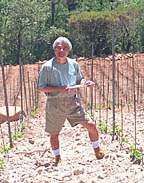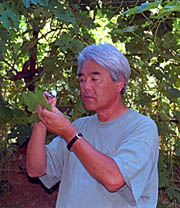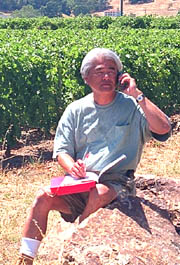|
With more than three decades of viticultural experience in the Napa Valley and other
California growing regions, Rich Nagaoka has expert answers for all of your viticultural
questions. The Grape Doctor provides a broad selection of viticultural consulting
services:
Rich doesn’t favor guesswork in his viticultural practice. Instead, he completes a
proper investigation – carefully assessing the soils, climate, varieties, cultural
practices, etc. – before assembling the data and finally drawing conclusions. Where
appropriate, Rich gathers input from additional experts, including engineers, geologists,
pathologists, winemakers, and vineyard managers. He issues his recommendations in a Report
Document that can be supplemented with an oral presentation.
Here is a more detailed breakdown of the consulting services provided by the Grape
Doctor:
Evaluations of
Potential Vineyard Sites for Owners and Prospective Purchasers.
- Determine plantable acreage
- Evaluate soils for classification, depth, structure, chemistry, fertility, drainage,
pathogens, and nematodes
- Estimate irrigation requirements
- Investigate, test, and evaluate potential water sources
- Assess the regional climate for varietal suitability, frost hazard, precipitation, heat
summation
- Investigate regional varietals and market conditions
- Recommend a development plan
- Top | Home
Vineyard
Architecture/Design.

- Identify the environmental resources of the site
- Assess the soils, slope, solar, wind, drainage, and temperature systems that impact the
vineyard
- Quantify the acreage
- Solicit opinions from successful local and regional vineyards managers, vintners,
engineers, and technologists
- Apply the viticultural science, experiential, folk, and market cultures to the design of
the vineyard
- Execute a design of the most appropriate viticultural science to the environmental
conditions
- Coordinate execution of the design by vineyard management
- Top | Home
Comprehensive
Evaluations of Existing Vineyards.
- Confirm planted acres
- Validate varieties, rootstock
- Assess yields, maturity, vintner contract/prices, wine style program
- Investigate soil classification, depth, structure, chemistry, drainage, diseases, and
pests
- Assess rootstock and scion for virus or disease
- Assess cultural practices
- Discuss wines produced with vintners
- Top | Home
Vineyard
Development -- Planning and Scheduling.
- Varietal and rootstock recommendation
- Spacing
- Trellising
- Vine training
- Block design by soils, slope
- Propagation methods
- Irrigation requirements and methods
- Frost protection options
- Assessment of pests and disease risk
- Fumigation recommendation
- Planting schedule
- Estimate yields
- Top | Home
Vineyard
Redevelopment Studies.
- Determine need to redevelop
- Assess productivity, pests, or disease problems
- Determine time line
- Assess varietal supply and demand
- Top | Home
Optimization of
Viticultural Practices to Improve Wine Grape Fruit Quality.
- Identification of problems and defects in wine quality, and determination of
relationships to viticultural practices (varietal selection, site-specific environmental
conditions, trellising, nutrition, irrigation, etc.)
- Recommendation of remedial treatments and mitigation strategies
- Recommendation of vineyard redevelopment plan where required
- Will mediate relationship between vineyard owner/manager(s) and vintner (execution of
timely harvest, pruning, irrigation, etc.)
- Ongoing evaluation of fruit quality and resulting wine characteristics
- Top | Home
Nutrition,
Pathology, and Entomology Investigations.

- Diagnosis of visual symptoms
- Plant tissue analysis
- Soil analysis
- Nutrient formulation and application methodology (rates, timing)
- Design of experimental performance tests, and subsequent result measurement and efficacy
analysis
- Top | Home
Autopsy Testing
and Evaluation.
- Investigation of crop loss, vineyard decline, and vine death
- Diagnosis by visual inspection,
field research, testing, and lab assay
- Recommendation of remedial treatments
- Alternative mitigation strategies – alteration of cultural practices including use
of biologicals and other organic strategies, environmental modifications
- Field triage and emergency field actions
- Long-term field testing and research grant studies
- Top | Home
Contract
Research and Efficacy/Residue Studies.
- Troubleshoot and identify unresolved questions, environmental impacts, and research
projects
- Formulate an appropriate methodology to address the question
- Design the scientific methods and identify goals of the research
- Apply for grant funding and submit funding proposal
- Identify and secure appropriate research sites -- vineyards, orchards
- Apply for any necessary permits and research authorizations
- Oversee cooperative relations among regulatory agencies, funding entity, and
ownership
- Select replications, experimental units, and methodology
- Label and map replicates, sub-plots, and individuals
- Calculate dilutions, concentrations, methods, and materials
- File notice of intent to apply materials to regulatory agencies
- Apply timely treatments
- Record and maintain appropriate documentation in compliance with standard operating
procedures
- Conduct post-treatment evaluations, and quantify and record readings
- Evaluate and report results
- Note: Research studies have included assessments of nematicides, fungicides, growth
regulators, nutrition, and cultural practices.
- Note: Clients have included Dow AgroSciences, Mycogen, Elanco, Unocal, and
Zeneca
- Top | Home
Expert Legal
Testimony.
- Expert legal testimony is provided on subjects including:
- Property condemnation
- Grape purchase agreements
- Irrigation issues and annual water use estimates
- Vineyard soil and water suitability
- Crop loss from off-site drift
- Safe agricultural spray practices
- Pest and disease effects on vineyard productivity and longevity
- Determination of reasonable yields by variety, region, and soils
- Effects of vineyard cultural production practices on the environment
- Note: Clients have included CalTrans, California Dept. of Water Resources, Coldwell
Banker, and the Sonoma County Sanitation District
- Top | Home
Vineyard
Administration for Absentee Owners.

- Ongoing evaluation of all aspects of vineyard operation to protect and advance owner's
interests
- Hiring and supervision of vineyard managers
- Assessments of the impacts of pests, weather, and other environmental circumstances on
vineyard health, crop quality, and vine longevity
- Identification of appropriate vintners for sale of crop, on basis of price and
prestige impact on vineyard valuation
- Marketing of the crop
- Liaison with other service providers including CPAs, attorneys, architects, surveyors,
and engineers
- Provision of regular full reports to absentee owner
- Note: Clients have included Clark Ranch Vineyards (Glen Ellen, Sonoma County), Villa
Mille Rosa (Oakville Appellation, Napa County), Valentine Vineyards (St. Helena, Napa
County), and B/A-Oreo Vineyards (Healdsburg, Sonoma County)
|




